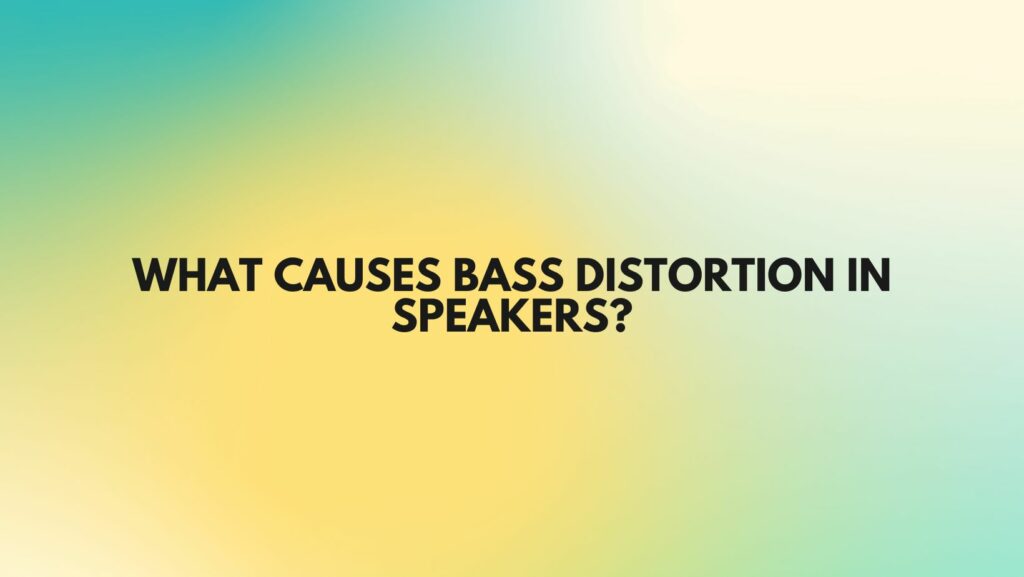Distorted bass in speakers can be a frustrating and undesirable experience for any audiophile or music enthusiast. Bass distortion not only compromises the quality of audio but also suggests underlying issues within the speaker system. In this comprehensive article, we will explore the common causes of bass distortion in speakers, helping you understand the factors that contribute to this problem and guiding you toward effective solutions.
Understanding Bass Distortion
Bass distortion, often characterized by unwanted artifacts such as buzzing, rattling, crackling, or muffled sound, occurs when the speaker produces sound that deviates from the original audio signal. It is essential to identify the root causes of this distortion to address the issue effectively.
Common Causes of Bass Distortion in Speakers
- Overpowering the Speaker
Overpowering a speaker with an amplifier that delivers more power than the speaker can handle is a common cause of bass distortion. When the speaker receives excessive power, it may exceed its physical limitations, leading to distortion.
Solution: Ensure that the amplifier’s power output matches the speaker’s recommended power handling capacity. Adjust the amplifier’s gain settings to prevent overloading the speaker.
- Clipping and Overloading
Clipping occurs when an amplifier is pushed beyond its limits, causing the audio waveform to flatten or “clip.” This phenomenon, especially during high-volume playback, can lead to harsh distortion.
Solution: Carefully adjust the amplifier’s gain settings to avoid clipping. Use a test tone and a multimeter to set the gain correctly, ensuring that the amplifier operates within its rated power.
- Low-Quality Audio Source
The quality of the audio source itself can introduce distortion, particularly in the bass frequencies. Low-quality audio files, poorly recorded tracks, or inadequate source components can contribute to bass distortion.
Solution: Use high-quality audio sources and files whenever possible. Consider upgrading to lossless audio formats to improve overall sound quality.
- Incorrect Wiring or Impedance Mismatch
Incorrectly wiring speakers or using the wrong impedance can lead to bass distortion. Wiring speakers in parallel or series can affect the total impedance, potentially causing problems.
Solution: Verify that the wiring of your speakers matches the manufacturer’s specifications. Use the appropriate gauge of speaker wire, and ensure that the impedance matches the amplifier’s requirements.
- Speaker Damage
Physical damage to a speaker, such as a torn or damaged cone, can result in distortion. Worn-out voice coils or damaged surrounds can also compromise sound quality.
Solution: Inspect the speaker for visible damage and replace any damaged components. If distortion persists, consider replacing the entire speaker.
- Enclosure Issues
The design and construction of the speaker enclosure significantly influence bass quality. Poorly designed or mismatched enclosures can cause distortion and muddiness in the lower frequencies.
Solution: Ensure that speakers are installed in enclosures that match their specifications and are suitable for your listening preferences (e.g., sealed or ported). Properly tune the enclosure for optimal bass response.
- Room Acoustics
In home audio setups, room acoustics can introduce distortion, especially in the lower frequencies. Sound reflections, standing waves, and room resonances can impact bass quality.
Solution: Implement acoustic treatments and room correction solutions to address room acoustics issues. Properly positioning speakers and using bass traps can help reduce distortion caused by room interactions.
Conclusion
Bass distortion in speakers can be attributed to a variety of factors, but with a systematic approach, you can identify and address the root causes effectively. Troubleshooting bass distortion based on the common causes mentioned above and implementing the appropriate solutions will help you restore your speaker’s performance and enjoy clear, undistorted sound. Regular maintenance, proper setup, and attention to audio source quality can also contribute to a distortion-free listening experience.


